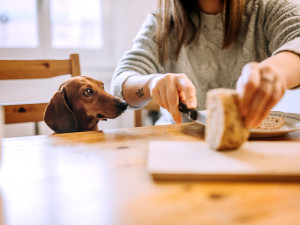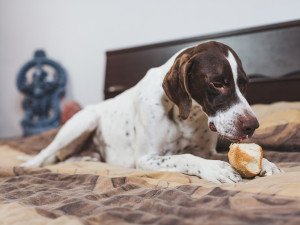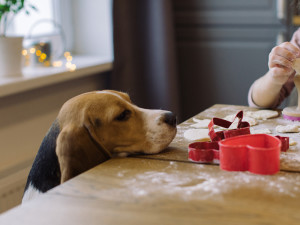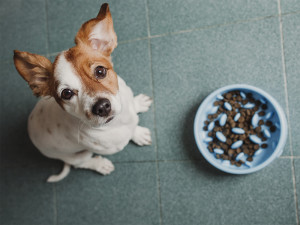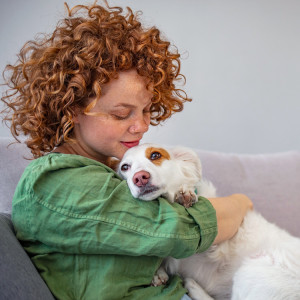Can Dogs Eat Garlic Bread?
It’s the king of sides, but definitely not for your dog. Read why.
No, dogs should not eat garlic bread. It contains multiple ingredients that are toxic or unhealthy for them and can make them sick. While there are many foods you can safely share with your dog, this is a good reminder that not all human foods are safe for them. Read on to learn more about garlic bread and dogs.
Nutrition facts about garlic bread for dogs
Recipes for garlic bread certainly vary, and the more you read about how to make garlic bread, the more your mouth may water. Most recipes contain a delicious combination of butter, garlic, herbs, spices, bread, parmesan, and mozzarella cheese. Toast it in the oven until it’s crispy and bubbling, and it’s definitely hard to resist. Many of these ingredients have important nutrients including fat, protein, carbohydrates, vitamins and minerals. However, the sources of these nutrients in garlic bread make many of them unhealthy and potentially toxic to dogs.
Is garlic bread good for dogs?
Garlic bread is not good for dogs. The combination of ingredients found in most garlic bread is unhealthy for dogs and can even be toxic. This includes:
Garlic: It’s right there in the name and is pretty much the star of the show, but when it comes to your pup, garlic should never be on the menu. Garlic is considered toxic to dogs due to a compound called N-propyl disulfide. This compound can cause digestive upset in mild cases and more serious damage to red blood cells, known as hemolytic anemia, if larger amounts are consumed. Cooking or drying the garlic has no effect on the toxic compound, so it’s still dangerous to feed your dog foods that are cooked with garlic or that contain garlic powder as well.
Butter: Butter has that perfect combination of high fat and dairy to kick the flavor up a notch in any dish. And while your dog would likely think butter is delicious, it can make them sick. Most dogs are lactose intolerant since they lack the enzyme, lactase, required to break down dairy. If they consume a lot of dairy, they are likely to suffer from digestive upset including bloating, gas, diarrhea, or vomiting. Additionally, high-fat foods can also cause digestive upset and even lead to serious pancreatitis in some dogs.
Cheese: It’s true: Dogs love cheese. But once again, cheese packs that one-two punch of high fat and lots of dairy that may make you both regret your choices. While the amount of lactose varies greatly between different cheeses, with parmesan usually having less, they all tend to be high in fat. This combination can lead to digestive upset, pancreatitis, and weight gain for dogs who frequently indulge in high fat snacks.
Can dogs eat other kinds of bread?
Bread can be OK for dogs in moderation but it really depends on the ingredients. Bread is typically high in carbohydrates, which can provide energy for dogs, but can also lead to weight gain if they consume too much. Breads that are lower in simple sugars and higher in fiber, such as those made from whole grains, can be a healthier option, but they should still only be used for the small, occasional treat. Beware of breads that may contain other potential toxins such as garlic, onions, raisins, nuts, or chocolate. These must be kept far out of reach.
How much do you spend on your pet per year?
Is garlic bread completely safe for dogs?
Garlic bread is not completely safe for dogs. It contains garlic, a known toxin to dogs, as well as multiple unhealthy ingredients, such as butter and cheese, which can make your pup sick. This is one food that should not be shared and should be kept out of reach.
If your dog accidentally gets into the garlic bread, be sure to contact your vet or a pet- poison hotline to discuss the best course of action. And certainly, if your dog is showing any signs of illness such as vomiting, diarrhea, lethargy, not eating, painful belly, pale gums, blood in the urine, or difficulty breathing, head to an emergency clinic right away.
The bottom line: Can dogs eat human food?
Dogs can eat lots of human foods and there are many options that are safe and healthy for you and your pup to share. Most of the time, plain, whole foods like lean meats, fruits, or vegetables are going to be the best option. Foods that are prepared with a lot of different ingredients, seasonings, spices, or oils can be trickier to evaluate and are more likely to contain items that are unhealthy or toxic.
Be sure to double-check all of the ingredients in anything you plan to share with your dog. Additionally, keep in mind that dogs have a specific set of nutritional requirements and it is most important that they eat a complete and balanced dog food diet. This means that treats and table food should be kept to a minimum to ensure they eat enough of the foods they really need and that they are not overfed.
A general rule of thumb is that all treats and table food should be less than 10 percent of your dog’s total dietary intake. By focusing on feeding them a high quality, balanced dog food diet, you can ensure your dog avoids any nutritional deficiencies and that they live their healthiest life.
Other foods that are good or safe for dogs:
Shrimp can be a high-protein treat.
Blackberries are rich in fiber and antioxidants.
Green beans can be a crunchy treat, too.
Other foods that are dangerous:
Chocolate is toxic to dogs and should be kept out of reach.
Grapes are incredibly toxic to dogs and should be avoided.
Onions and all plants in the Allium family are also toxic to dogs.
FAQs (People also ask):
How much garlic bread can a dog eat?
Dogs should not eat garlic bread. It contains multiple ingredients that can make them sick.
Is it OK to give dogs garlic bread?
No. Garlic bread is not safe for dogs and can make them sick.
Why do dogs like garlic bread?
Dogs are often attracted to foods that are high in fat and protein and garlic bread has both; however, it can make them sick and should not be shared.
Can dogs eat garlic?
Garlic is toxic for dogs and can cause digestive upset as well as more serious hemolytic anemia if they consume enough.

